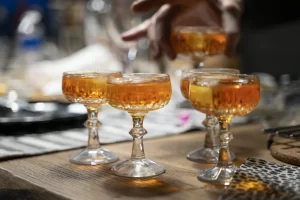Kentucky Liquor Laws And Regulations
Need we say it? Kentucky is the home of bourbon. The state boasts around 70 bourbon distilleries in an area now known as Kentucky Bourbon Country – the undisputed bourbon capital of the world.
But bourbon isn’t all Kentucky produces. There are a number of Kentucky distilleries that produce rye whiskey, gin, vodka, moonshine and more. The first distillery in Kentucky dates way back to the 18th century!
So Kentucky’s rich history is practically laced in alcohol production.
And if you’re looking to know what it takes to operate a distillery in Kentucky, this guide has everything you need to know.
State Fees
Like other states, Kentucky has various state fees for starting and operating a distillery.
These fees can depend on the size of the distillery, type of alcohol manufactured, the amount of alcohol produced, and the amount of alcohol stored.
The state distiller fees include:
- Permit – a permit to produce from Alcohol and Tobacco Tax and Trade Bureau (TTB), which involves an application fee and annual fee for maintaining the permit
- State License – a distiller license from the Kentucky Department of Alcoholic Beverage Control (ABC), which also involves a license fee and annual renewal fee
- Production fees – fees for each gallon produced, which can depend on the type of liquor and amount produced
- Barrel tax – a tax on each barrel kept in the distillery for production and storage
Licensing Requirements
To legally distill liquor in Kentucky, all distillers need a state distiller license. The distiller license permits the legal manufacturing of liquor in the state, which can be obtained from the Kentucky Department of Alcoholic Beverage Control (ABC).
Obtaining the distiller license involves submitting an application to the Kentucky Department of Alcoholic Beverage Control, then renewing the license annually. Applying for the state license and renewing it both come with a fee.
Distillery Laws And Restrictions
Kentucky has various laws and regulations that govern the operation of distilleries in the state. It’s important to be aware of these distillery laws and regulations—plus federal laws and city laws—as violations can result in fines, license revocation, and other penalties.
The main distillery laws and regulations in Kentucky are listed below.
Licensing
Distilleries in Kentucky need to obtain a license from the Kentucky Department of Alcoholic Beverage Control (ABC) to produce and sell alcohol. The process includes an application and annual renewal, both of which have fees.
Production and Selling Limits
There is no onsite production limit for distilleries in Kentucky, but distilleries are limited to selling no more than nine liters of alcohol per person, per day.
Tasting Rooms
Kentucky law allows distilleries to have tasting rooms where visitors can sample and purchase their products. However, Kentucky law limits tasters to a maximum of 1.75 oz. of bourbon for tasting per person, per day.
Advertising
It should go without saying that Kentucky law prohibits distilleries from advertising their products in a way that is misleading or deceptive. Distilleries are also not allowed to advertise liquor in a way that appeals to underage consumers.
Environmental Regulations
Kentucky has several environmental regulations that include air quality for emissions, waste, and chemical storage. These can apply before and after the distillery is constructed.
How To Start A Distillery
Starting a distillery in any state requires a business plan and the necessary funding or capital. It isn’t an easy process—and is often long—but can be a rewarding venture if you’re passionate about a specific spirit as well as the alcohol history or alcohol culture of the state.
A few factors to consider include:
- Location
- Size of distillery
- Brand
- The type of liquor to manufacture
- How to set your liquor apart from other products
- Marketing
- Distributors
Other factors include:
- Costliness
- Collateral if you plan on getting a loan
- The period before business becomes profitable
In most cases, distilleries won’t see profits for at least 10 years. This makes operating a distillery a long-term process that requires dedication, passion, and an investment of time, effort, and money.
Type Of Liquor To Manufacture
 Before starting a distillery, it’s worth knowing what kind of liquor you want to produce. Some liquors are harder to produce than others—involving trickier distilling processes or an aging process—which can affect factors like time, effort, and cost.
Before starting a distillery, it’s worth knowing what kind of liquor you want to produce. Some liquors are harder to produce than others—involving trickier distilling processes or an aging process—which can affect factors like time, effort, and cost.
The main types of distilled spirits include:
- Vodka – a clear, neutral spirit made from grains like wheat or rye, considered easier to distill than other spirits
- Gin – a clear spirit that is flavored with botanicals, such as juniper berries and other herbs, which, like vodka, is considered as one of the easiest spirits to distill
- Whiskey – a distilled spirit that is typically made from grains like barley, rye, or corn and aged in oak barrels, considered harder to distill than vodka and gin and often aged for at least 5 years
- Rum – a distilled spirit made from sugarcane juice or molasses, also considered harder to distill than vodka and gin with an aging process of 5–7 years
- Brandy – a spirit made by distilling wine, often aged in oak barrels for at least 2 years but aging can also be longer than 10 years
- Tequila – a distilled spirit made from the blue agave plant, considered the most expensive spirit to distill with an aging process that can be anything from 2 months to more than 3 years
Kentucky Moonshine Laws
Kentucky moonshine laws are historically rooted in the state’s deep connection to whiskey production. The Kentucky moonshine laws have undergone significant changes over the years. The state’s whiskey heritage dates back to the 18th century, with moonshine being a staple of distillation during Prohibition.
Today, Kentucky’s moonshine laws have evolved to regulate the production and sale of distilled spirits more comprehensively. These laws play a crucial role in ensuring the quality and safety of alcoholic beverages produced within Kentucky. The state’s regulatory framework encompasses licensing, labeling, taxation, and distribution.
Kentucky’s moonshine laws require a strict adherence to standards in order to maintain the integrity of the state’s alcohol production, sales, and consumption. The production of moonshine remains illegal without proper licensing and oversight. Kentucky’s modern liquor laws reflect a balance between preserving its rich whiskey traditions and ensuring a regulated and responsible industry.
If you are interested in producing Moonshine in Kentucky, you will want to follow the laws and start a craft distillery or a micro-distillery with proper procedures and licensing.
Distillery Equipment
Another big part of starting a distillery is rounding up all the equipment you’ll need to begin distilling spirits.
Some of the equipment needed to start a distillery include:
- Still
- Fermentation tanks
- Barrels
- Testing equipment
- Storage tanks
- Bottling equipment
- Labeling equipment
You’ll also need the raw materials needed for the liquor you want to produce, as well as general health and safety equipment to ensure the safety of the distillery and the people working there.
Get Involved with the State Distillers Guild/Association
One of the best ways to start a distillery in any state is to get involved with the state distillers’ Guild or state distillers’ association.
For Kentucky, the state distillers’ guild is the Kentucky Distillers’ Association.
By getting involved with the state distillers’ guild or state distillers’ association, you’ll be able to network with state distillers and learn important information about how to start a distillery and how to operate a distillery in the state.
This includes the necessary state fees to pay, licensing requirements, and state distillery laws and restrictions.
Conclusion
There are a lot of laws, regulations, and fees for distilleries operating in Kentucky. This is no different from any other state, however, and shouldn’t stop you from starting a distillery if you’re passionate about spirits or even the liquor culture and history of Kentucky.









